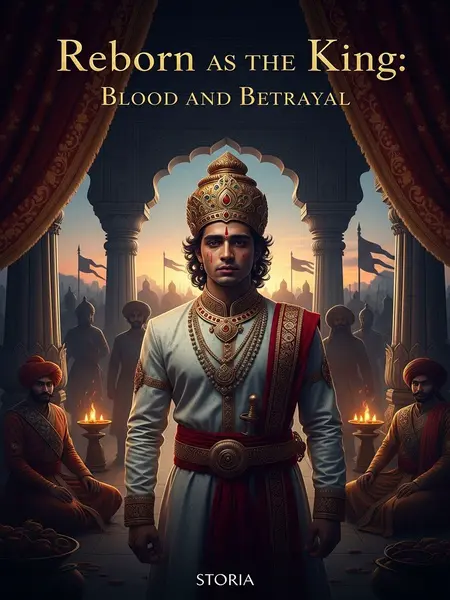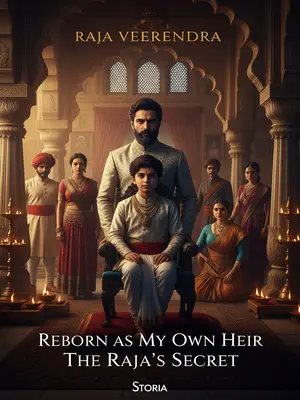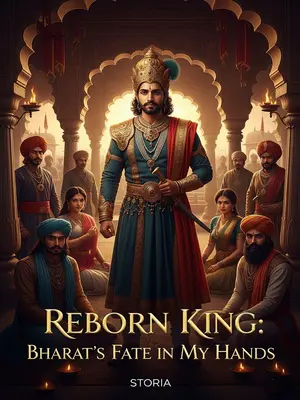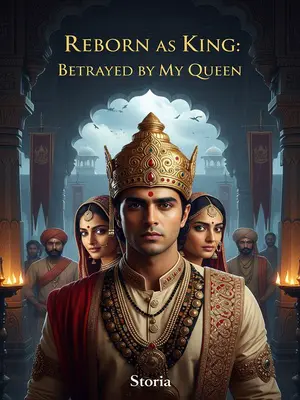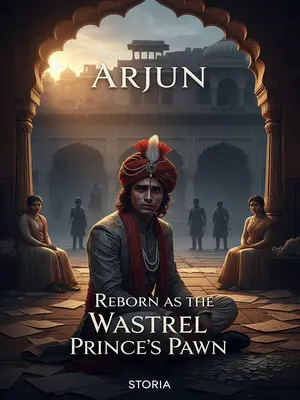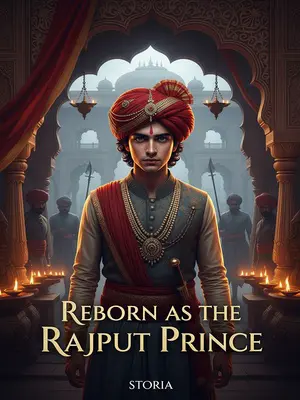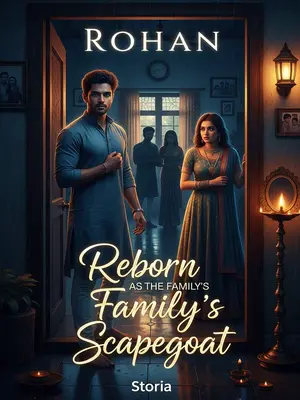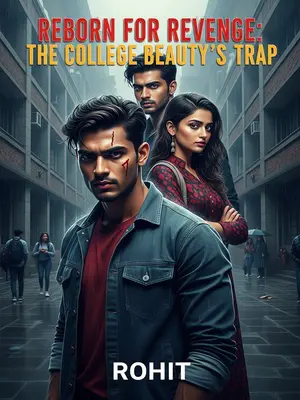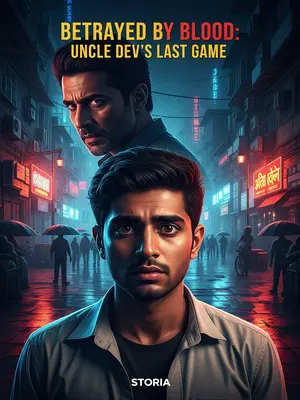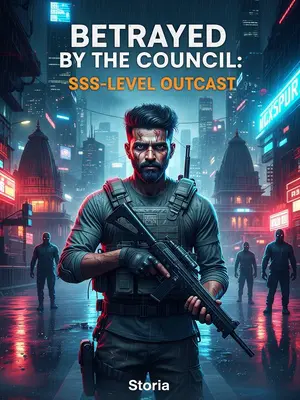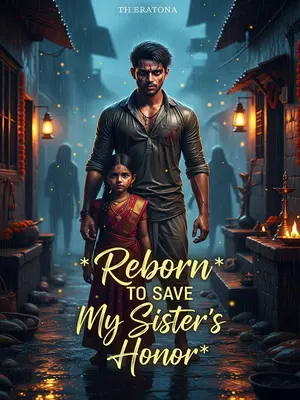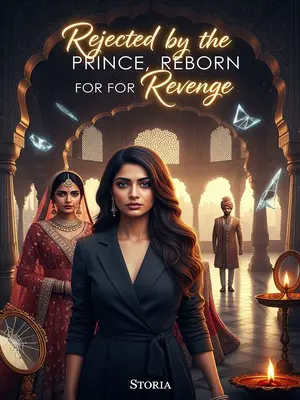Chapter 2: The King’s Sword Falls
On the way back from the Rajmahal Hall, Commander of the Palace Guards Yusuf Khan was inexplicably uneasy.
He tugged at his collar, beads of sweat forming despite the cold. The rustle of uniforms, the creak of leather boots on stone—he heard them all, amplified by his unease.
The king ahead seemed somehow different.
There was a looseness in his stride, a stillness in his eyes—like a tiger that has remembered its claws. Yusuf’s gut twisted in warning.
The face was the same, the person was the same, but those eyes, that bearing—he simply did not seem like the king of old.
He wondered, not for the first time, if the royal astrologer’s predictions about strange omens were coming true. He made a silent prayer to Allah for guidance.
For instance, as the king walked, seeing the attendants’ hands red with cold, he would fetch a few hand warmers from the royal carriage and calmly order them distributed, urging everyone to stay warm.
The sight startled everyone. No king, at least none Yusuf had served, had ever noticed the chapped hands of a mere attendant. The chill in the air was suddenly broken by the warmth of unexpected kindness.
The attendants were terrified, but the king only smiled, urging them to hurry back to the palace so Prime Minister Joshi would not worry.
Some hesitated, clutching the hand warmers as if they might vanish. A few whispered silent prayers for the king’s health, their suspicion mingling with hope.
Afterwards, the king stuck his head out of the carriage, entirely lacking in royal decorum, his gaze sweeping the crowd, finally settling on Yusuf Khan.
A child in the crowd pointed and giggled, “Dekho, raja saab mast lag rahe hain!” The older guards exchanged nervous glances, unused to such informality.
Yusuf Khan straightened and said, “Huzoor, main haazir hoon.”
He saluted smartly, chest puffed out with both pride and anxiety. The winter wind stung his eyes, but he refused to blink.
Arjun Pratap smiled even more easily. “It’s nothing, I just remembered that there’s a pile of charcoal in the Rajmahal Hall. It would be a waste to leave it there. Take some men and bring out the charcoal, so everyone can keep warm on the road.”
His voice was as casual as a neighbour’s request for a cup of sugar, yet it carried the weight of command. For a moment, Yusuf was at a loss for words.
Yusuf Khan was startled, bowed his head, and said, “Maharaj’s person is precious. The charcoal in the Rajmahal Hall is of the finest sandalwood and coconut kind, reserved for the royal household. How could humble servants like us—”
His protest sounded weak, even to his own ears. The other guards shifted uncomfortably, eyes darting between king and commander.
“I told you to take it, so take it.”
Arjun Pratap cut Yusuf Khan off, his tone leaving no room for doubt. Yusuf Khan looked up, meeting Arjun Pratap’s steely gaze.
The force in those eyes left no space for argument. It was the look of a man who had seen too many betrayals to tolerate one more.
And so it was. The guards and attendants carried off nearly a hundred hand warmers. In the bitter north wind, mist swirled, and many had tears in their eyes.
One elderly servant murmured a blessing, “Bhagwan raksha kare,” as warmth spread through his chilled palms. For the first time in years, the long walk back to the palace felt almost bearable.
Yusuf Khan did not shed tears. He was summoned to Arjun Pratap’s side for questioning.
He approached cautiously, boots clicking on marble, ready for anything—from a royal rebuke to a whispered secret.
Arjun Pratap asked casually, “What do you think of Prime Minister Joshi? And of General Vikram?”
Yusuf Khan was nearly frightened to death.
His pulse raced. These were questions that could end a career—or a life. He silently recited the kalma, just in case.
Is this something I should answer?
He glanced sideways, hoping for a sign, but there was only the king’s patient, piercing stare.
But the king had asked, so Yusuf Khan could only say, “Prime Minister Joshi is loyal to the country, the most faithful in the kingdom. General Vikram is a fine man, but unfortunately cannot understand Maharaj’s burdens, often defies orders, and finally strayed onto the wrong path.”
He picked his words with care, like a man crossing a river full of crocodiles, praying his voice would not betray his doubts.
Arjun Pratap chuckled. “I know. You were the one who arrested Vikram. Since he went astray, why did you bring him to the capital?”
The laughter was not mocking, but it sent a shiver down Yusuf’s spine. He swallowed hard, remembering every moment of that long, difficult march.
Yusuf Khan wiped his sweat and nodded. “A few months ago, when I went to see General Vikram… Vikram told me directly that my visit could mean nothing good. Then he invited me in to drink. I thought the chai must be poisoned, that Vikram, knowing he would die, did not want to die in prison, so he wanted me to die with him. I fought the invaders with Vikram in my early years, and thought that if it ended this way, it would be alright, so I drank with him.”
He remembered the bitter taste of the chai, the way the rim of the steel glass burned his lip, and Vikram’s tired smile across the smoky room.
At this, Yusuf Khan’s expression dimmed.
He looked away, blinking back a tear that threatened to betray him. Sometimes, the old bonds hurt more than any wound from the battlefield.
“I didn’t die, and Vikram didn’t die. Vikram just smiled and said, ‘You’re still my brother. I’ll go with you.’”
The words hung in the air, heavy with unspoken grief and the brittle hope of forgiveness. Somewhere nearby, a temple bell tolled, as if echoing the finality of that moment.
Wind and winter howled. Arjun Pratap and Yusuf Khan fell silent for a long moment.
Their breaths steamed in the cold, and for a while, only the sound of distant drums from a wedding procession far away could be heard. Each man stood wrapped in his own sorrow.
After a while, Arjun Pratap patted Yusuf Khan on the shoulder, his expression unreadable. “You have it hard, too. I know Vikram’s merits, but for the sake of the state, I cannot tolerate him.”
The touch, brief and firm, said more than words. In that gesture was the weight of all unspoken apologies between old comrades forced onto opposite sides.
Yusuf Khan opened his mouth, wanting to speak, but in the end, all his words turned into a sigh.
He closed his eyes, letting the sigh carry away the last of his defiance, replacing it with resignation as old as the land itself.
After returning to the inner hall, Arjun Pratap sent Yusuf Khan to fetch the history books. “Tomorrow the invaders’ envoys arrive. I want the histories from the end of the Mughals to now, to see how previous kings dealt with the barbarians.”
He spoke with the urgency of a man who knew knowledge was as sharp a weapon as any blade. The soft yellow glow of the oil lamps flickered, painting shadows on the ancient stone.
Yusuf Khan took the order and couldn’t help rolling his eyes inwardly.
He kept his face carefully blank, but inside he muttered, “As if any book will tell you how to deal with these snakes.”
With your way of handling things, aside from the puppet king Raja Trilok, there’s no one else to learn from.
A faint smile tugged at the corners of Yusuf’s mouth as he remembered the old stories his grandmother used to tell—of kings who ruled from behind curtains, their strings pulled by clever ministers.
While Yusuf Khan went for the books, Arjun Pratap wandered the inner hall, searching for more documents. The more he understood of this world, the more control he would have.
He moved with the restless energy of a man denied sleep for days, his hands rifling through stacks of parchment, his eyes catching every detail.
Most prominent among the documents were those on the kingdom-invader peace talks. Most officials supported them; a few fiercely criticised Arjun Pratap for ruining the country and harming the people. Arjun Pratap memorised these names for future reference.
He wrote them mentally in a secret ledger, promising himself, “Inquilab toh zaroor hoga. Let’s see whose names are cleared, and whose are stained forever.”
Then Arjun Pratap found a corner of the hall stuffed with items.
There, in the half-shadow, a forgotten world slept—a jumble of half-broken chests, silks faded by time, and relics no one dared touch.
Among them: gold sashes, bows, swords. Digging deeper, Arjun Pratap pulled out a great banner, four characters upon it: ‘Utmost Loyalty Vikram.’
The cloth was tattered, the gold thread fraying, but its presence was a silent rebuke. Dust motes danced in the shaft of light falling from a high window, as if the spirits themselves stirred at the banner’s unveiling.
The silent wind stirred that tattered banner. Arjun Pratap’s expression turned cold.
His jaw set, lips pressed into a thin line. The wind, sneaking through the cracks, made the banner flutter, and for a moment, Arjun felt the weight of all those betrayed dreams.
So this was where the rewards once bestowed by the king upon Vikram ended up. After Vikram was accused, no one dared keep these things, so they were sent back to the palace.
He thought of all the medals returned in shame, the garlands left to wither at the feet of forgotten heroes. In every kingdom, gratitude had a short memory.
If the king could reward a general so lavishly, Samar Pratap must once have held real power.
But power, Arjun knew, was a river—always shifting, always dangerous. He wondered how a man with so much could lose it all so quickly.
With real power, how did it come to this?
He shook his head, a sigh catching in his throat. Old age had taught him that nothing was more fragile than a king’s favour.
Arjun Pratap’s brow furrowed deeper. Looking at the banner, a thought struck him: Who says only powerful ministers can betray the country?
He remembered the tales of traitor kings, their names spat out with contempt in folk songs sung during the harvest.
Perhaps even the king can betray the country.
The idea landed with a thud in his heart. Was he now fated to be the redeemer, or just another chapter in a story of ruin?
Arjun Pratap tossed the banner aside, face cold, and looked again into the corner.
The banner fell in a dusty heap, stirring up old memories. He pushed aside a cracked ceremonial shield, its once-glittering surface dulled by years of neglect.
If the king and ministers betray the country together, even a newcomer like Arjun Pratap could see: there were likely few loyal officials left at court.
He felt a chill, deeper than the winter wind outside. He made a silent promise to himself to trust only what he could see with his own eyes.
Don’t think that just because Yusuf Khan obeys now, if you truly want to set things right, Yusuf Khan and his guards will necessarily follow. Since ancient times, cutting off a man’s livelihood is like killing his parents. Arjun Pratap, an old hand, understood this well.
He remembered an old proverb his father used to mutter: “Pet ka sawal hai, beta. No one forgets a hungry night.”
To save Vikram, to restore the kingdom, to launch a northern campaign—this would require a long-term plan.
He rolled his shoulders, letting the tension bleed away, preparing himself for a battle not of days but of years. "Accha, Arjun, soch samajh ke kadam uthana hoga."
Arjun Pratap exhaled, suppressing his impatience, and continued searching.
He stilled his shaking hands, eyes darting over every scroll and scrap as if each might hold the key to survival.
There were other things in the corner—mostly letters between Samar Pratap and Vikram. Arjun Pratap ignored Samar Pratap’s edicts, searching only for Vikram’s words, hoping to glimpse the man himself.
He sifted through stacks of correspondence, each letter carrying the scent of old ink and vanished hopes. He searched for that unmistakable urgency, that spark of rebellion.
Then he saw a long essay.
Its title: ‘Memorial on Sending Forth the Troops.’
The paper was thick, the script bold—a warrior’s hand, not a scholar’s.
Arjun Pratap thought, this must have been written years ago, when Vikram first set out to campaign north.
He could almost see Vikram, sleeves rolled up, forehead creased, dictating every word to a trembling scribe by the light of a single diya.
Then a line caught his eye:
“The late king’s grand enterprise was not yet half complete when he passed; today the realm is divided in three, and Rajpur is exhausted and weak—truly a moment of life and death.”
The words struck like a slap, the bitter truth laid bare without mercy. For a moment, Arjun forgot where he was, lost in the echo of an old world’s despair.
Reading this, Arjun Pratap suddenly felt something amiss. His mind grew muddled. This tone, this predicament, was just like that of a scholar nine hundred years ago.
A shiver ran through him, a memory uncoiling from the depths—a night in Kaveripur, a lamp guttering in the storm, a promise made and broken.
The old haveli at Malgudi, lofty aspirations; Kaveripur, temples silvered with frost.
He saw himself, young and foolish, racing through the narrow lanes of Malgudi, his heart beating with dreams he was too poor to name. The cold, the hunger, the endless striving—had it all led only to this?
“Yet the officials within the palace do not slacken, and the loyal men outside forget themselves for the cause. All strive to repay the late king’s exceptional favour, wishing to return it to Maharaj.”
He read these lines again and again, the words searing themselves into his heart. They sounded like the dirge of every loyal soul crushed by fate.
Arjun Pratap’s hands began to tremble.
He clenched his fists, knuckles white, fighting the urge to weep aloud. Years of discipline buckled beneath the weight of that sorrow.
He kept reading, reading of loyal ministers, then of being a commoner, farming in Malgudi… The late king did not regard me as lowly, but thrice visited me at the old haveli… entrusted me at the time of defeat, ordered me in times of peril, and for twenty-one years since then…
Each word was a blow, breaking down his defences. The room blurred, the letters on the page swimming as tears filled his eyes.
Tears streamed down Arjun Pratap’s face, unstoppable.
He did not bother to wipe them away. It was as if the dam of a lifetime had burst, and all the water rushed out at once.
“The late king knew I was cautious, so on his deathbed entrusted me with great matters… In May I crossed the Yamuna, ventured into the wilds. Now the south is pacified, arms are sufficient, it is time to reward the three armies, pacify the Central Plains, restore the kingdom, and return to the old capital. This is how I repay the late king and fulfil my duty to Maharaj.”
He mouthed the words silently, lips trembling. They were not just Vikram’s—they belonged to every man who had ever tried and failed, and tried again.
As he read, the words blurred. He reached to wipe the page, but it remained indistinct—only then did he realise his tears had fallen upon it.
His shoulders shook, his heart wrung dry. Even the gods, he thought, would understand this weeping.
Wiping away the tears with the edge of his angavastram, a harsh, guttural wail burst from the hall.
The sound was raw, animal, the kind of cry one only lets out when the world’s weight presses down too heavily to bear in silence.
Arjun Pratap wanted to curse, to shout, to order himself to stop crying, but found his throat could not make a sound.
Instead, the grief poured out in choked sobs, the shame and longing of a thousand forgotten men finding voice in him.
So it was himself who was crying.
In that moment, he was both child and king, rebel and exile, weeping for everything lost and everything that might yet be reclaimed.
That weeping echoed through the hall, through the palace city, through the deep night and the bleak north wind, from the blue heavens above to the river below—crying for nine hundred years, unable to see the youth he once was.
It was as if the walls themselves absorbed his grief, the stones remembering every injustice, every broken promise made beneath their silent gaze.
When Yusuf Khan returned with several boxes of books, he saw Arjun Pratap clutching the ‘Memorial on Sending Forth the Troops,’ weeping bitterly.
He hesitated at the threshold, torn between duty and compassion, the memory of his own father’s silent tears rising unbidden.
Weeping in sorrow and desolation, in melancholy and heartbreak, for a long, long time.
No one dared interrupt. Even the palace dogs, sensing the gravity of the moment, slunk away to the shadows.
No one knows how long before Arjun Pratap finally stopped. After this outpouring, he seemed to shed many shackles, truly inhabiting this world.
He wiped his face with the edge of his angavastram, his breaths coming slower, steadier, as if something heavy had at last been laid down.
It turned out, from ancient times to now, it was always the same sky and earth.
Arjun Pratap looked at Yusuf Khan, shook the paper in his hand, and asked, “Who did Vikram copy this from—Prime Minister Chanakya?”
His tone was half-mocking, half-reverent, as if speaking of a childhood hero whose legend outlived all empires.
Yusuf Khan nodded, a little dazed. “Yes, the ‘Memorial’ is renowned for a thousand years—who but Chanakya could compare?”
He spoke with pride, as if merely reciting the name might grant some share in its glory.
Arjun Pratap grinned and waved his hand. “Alright, pick out the histories of the late Mughals for me first.”
The easy command masked the exhaustion in his eyes, but his spirit had found new ground.
Yusuf Khan was efficient, arranging books as he spoke. “Maharaj, actually, Vikram admired Ranjit Singh and Pratap Singh more. He once told me that if in this life he could be remembered in history like them, he would not have lived in vain.”
A wistful note crept into his voice, betraying his longing for the old days, when heroes still walked among men.
Arjun Pratap said nothing, only glanced at Yusuf Khan. “You really can’t forget Vikram, can you?”
The question was gentle, but carried a weight that made Yusuf lower his gaze.
Yusuf Khan grew nervous, pursed his lips. “I dare not.”
He braced himself, waiting for a rebuke that did not come.
Arjun Pratap laughed. “It’s alright—even if you dared, you should.”
The laughter was rich, forgiving, a reminder that the world still allowed for small mercies.
While Yusuf Khan was still bewildered, Arjun Pratap began reading, flipping from Kaveripur onward, seeing the decline of his old kingdom, rebellions everywhere, shortages of grain and men, seeing Chanakya, with one man’s strength, exhaust himself to pull the kingdom from the abyss, still able to write the ‘Memorial,’ still able to campaign north.
He devoured the pages, chasing wisdom in every line, every failure, every desperate gamble. The names and faces blurred into a single, endless struggle.
Arjun Pratap’s eyes reddened again.
He blinked rapidly, refusing to let another tear fall, but the ache in his chest would not be banished so easily.
Then came the turmoil in the heartland, three regions responding, but lost at a crucial battle.
He slammed his fist down so hard that the oil lamp shuddered, its flame trembling.
Arjun Pratap slammed the table, hard.
The sound echoed in the marble silence, a sharp reminder that history never forgave weakness.
Yusuf Khan’s eyelid twitched.
He stood stock-still, every muscle tensed, waiting for the next storm.
Then Chanakya marched out again and again, each time failing at the last moment, until he died exhausted, perishing in the autumn wind.
The story wound its way through Arjun’s mind, haunting him like an old song sung out of tune.
Arjun Pratap suddenly closed the book.
He let it fall, the covers smacking together with a finality that silenced even the shadows.
He closed his eyes, letting tears fall, and said to Yusuf Khan, “Call Prime Minister Joshi. I have urgent matters to discuss.”
His words were hoarse, but his resolve was clear as steel.
Yusuf Khan was stunned—he’d been stunned countless times today. The king was far too unusual; that indescribable temperament was even more pronounced, but Yusuf Khan just couldn’t figure out what it was.
He rubbed his hands together, glancing nervously at the blood-red sunset outside. The world, it seemed, was about to turn upside down.
Arjun Pratap opened his eyes, a cold light flashing: “Still not going?”
The old command thundered in the small room, and Yusuf found his feet moving before his mind could catch up.
Yusuf Khan instinctively straightened. “Your order, Maharaj!”
He left at a run, the echo of Arjun’s voice ringing in his ears like the roar of a lion.
That night, Joshi entered the palace late, as was his custom. He thought nothing of it—the invaders’ envoys had arrived, and in recent days the king had been recuperating, practicing Sanskrit in the Rajmahal Hall. Now was just the time to discuss affairs.
He smoothed his beard, adjusted his angavastram, and prepared his usual speeches—long-winded, careful, always hedging bets.
Only Yusuf Khan looked a bit strange, saying the king seemed different today.
Yusuf’s voice trembled with something like awe, and his eyes darted about, as if he expected ghosts to rise from the palace stones.
Joshi smiled faintly. “The invaders have come; it’s natural for the king to be a little unsettled.”
He spoke with the calm assurance of a man who had weathered too many storms to be rattled by mere rumour.
But when he entered the inner hall, Joshi realised just how different the king truly was.
He froze at the threshold. The air inside was charged, electric—a tension that made his skin prickle.
Arjun Pratap sat casually on the throne, idly flipping through ‘Annals of the Kings.’ When he looked up at Joshi, his gaze was careless, even disdainful—not like a king, but like a wandering swordsman.
There was an insolence in his posture, a challenge in his eyes, as if daring Joshi to play his usual games.
Joshi bowed. “Maharaj summoned me—what is your command?”
He kept his tone light, his eyes lowered, hands folded respectfully in front of him.
Arjun Pratap closed the book, smiling. “Nothing major, I just wanted to ask: if the kingdom faces a crisis, must it be solved step by step? If we act rashly, changing orders overnight, would that not plunge the court into chaos and give the enemy an opening?”
He tilted his head, as if genuinely seeking counsel, but there was a razor-edge to his curiosity.
Joshi considered. “That is generally so, but it depends on the matter at hand.”
He weighed his answer, careful not to betray the unease knotting his stomach.
Arjun Pratap said, “For example—the peace talks with the invaders.”
His tone was deceptively mild, but Joshi caught the glint of danger behind the words.
Joshi understood. The king was wavering. He replied calmly, “As Maharaj says, if we do not negotiate now, not only will the court fall into chaos, but the invaders will show no mercy. Negotiating first and preparing for war is the safest policy.”
He delivered the line as if reading from a script, each word calculated to soothe and placate.
Arjun Pratap sighed, stood up, walked to the corner, and picked up the sword Samar Pratap had once bestowed on Vikram.
The blade flashed in the lamplight, a memory of old battles etched along its edge. Arjun’s hands were steady, his eyes alight with an inner fire.
He said, “Prime Minister Joshi, whenever I think that these peace talks require Vikram’s blood, require the flesh and blood of countless people to feed the invaders, I feel uneasy.”
His voice was thick with sorrow and anger, the words heavy as anvils dropped on Joshi’s conscience.
Joshi had never heard such words before, but it didn’t matter. He was prepared to reason with the king, to explain that the invaders could not be defeated, that Vikram’s victories were mere exaggeration and insubordination.
He drew in a breath, marshalling his facts and excuses like soldiers before a hopeless battle.
But before he could speak, Arjun Pratap continued, “Besides, these are not peace talks at all—this is our kingdom bowing and scraping, becoming the invaders’ dogs. My legs are not strong, I cannot kneel, so you, Prime Minister Joshi, said you would kneel for me. But you not only kneel yourself, you break the legs of those who refuse to kneel. Isn’t that going too far?”
His words rang out, echoing off the marble walls, each syllable slicing through the silence like a knife.
Joshi, you broken-backed dog, how dare you usurp the position of prime minister?
The insult landed like a slap, reverberating through the hall. Even the statues seemed to flinch at the king’s fury.
The words ‘broken-backed dog’ echoed again and again in the hall, Arjun Pratap’s voice deliberately raised. Yusuf Khan stood at the door, dumbfounded, thinking, Has the king gone mad today?
He pressed his back to the wall, heart pounding, uncertain whether to intervene or flee.
Joshi, for once, lost his composure. “Maharaj, how can you insult your minister so?”
His voice trembled with outrage, but his eyes flickered with fear. The balance of power had shifted, and he knew it.
Arjun Pratap raised the sword, walking toward Joshi. As he approached, wind and winter flashed in his eyes, and the hidden fire surged forth.
His footsteps rang on the marble, each step measured and certain. The air seemed to crackle with anticipation.
Arjun Pratap said, “I’m not insulting you—I just don’t want you to die without understanding.”
His voice was low, deadly calm—the voice of a man who has already made peace with his own demons.
Joshi was stunned, not knowing what the king meant. Then, suddenly, the hall darkened, then brightened. Wind whistled past his neck, and he saw, in that instant, every choice that had led him here—every bribe, every betrayal, every salaam.
Only then did Joshi realise: that was the flash of a sword.
It was over before he could draw breath, the old stories come alive in a single, merciless instant.
That sword light was so bright, the entire hall seemed to dim for a moment.
The blood that followed was dark as pomegranate juice, staining the white marble in a spreading pool.
In his last instant, Joshi couldn’t help but think: The king’s sword is so fast.
Regret, sharp and cold, stabbed through his heart as the world faded to black.
Arjun Pratap sheathed his sword.
The soft scrape of steel on leather was the only sound, the final punctuation to a long, unfinished sentence.
He stood in the hall, his gaze following Joshi’s severed head as blood spurted three feet, then thudded to the floor.
Outside, a dog howled, and somewhere in the city, a watchman’s stick struck stone in alarm.
Inside and outside the hall, there was silence.
A breathless, horrified silence, as if the world itself hesitated to take its next step.
Yusuf Khan—Arjun Pratap called, startling the palace maids, attendants, and guards into shrieks.
His voice broke the spell, sending the women scurrying for shelter and the men glancing nervously at one another, afraid to meet his eyes.
Yusuf Khan, at least, did not scream. His jaw trembled, eyes blank. “Maharaj, what are your orders?”
He forced himself to stand straight, though every instinct screamed at him to run.
Arjun Pratap stared coldly at him. “Joshi is dead, but many things are unresolved. There is much I do not know—how many of Joshi’s men are in the guards, whether you, Yusuf Khan, are one of his. I know nothing.”
His words were blunt as a sledgehammer. He left no room for doubt or comfort, only the hard clarity of truth.
Yusuf Khan was shocked again, this time finally snapping back to himself, hurriedly kneeling. “I have followed Maharaj for twenty years—I am only Maharaj’s man.”
He pressed his forehead to the cold marble, sweat dripping onto the stone, silently pleading for mercy.
After speaking, Yusuf Khan instinctively thought: No, if the king knows nothing, how does he dare kill?
His mind raced, trying to make sense of the madness, even as his heart pounded with hope.
Actually, I hadn’t intended to kill today. Arjun Pratap seemed to hear Yusuf Khan’s thoughts. He held the sword, hands behind his back, gazing far away. “But Chanakya died at Kurukshetra.”
The words hung in the air, heavy with history. Every child in the land knew what it meant for a king to avenge his fallen mentor.
Yusuf Khan:
He lifted his head, uncertain, searching for some sign of what would come next.
Arjun Pratap’s gaze returned to Yusuf Khan. “Chanakya died at Kurukshetra, Sushil survived. Why must this world burn up Chanakya and Vikram, leaving only dogs to wield power? Back then, I couldn’t stand the local collector oppressing the people, couldn’t stand the invaders slaughtering Rajpur, couldn’t stand traitors’ betrayal. I was good at enduring, I knew it was safer to wait, to distinguish loyal from traitorous before acting. But when I saw Chanakya die, I could no longer bear it.”
His words rolled out like thunder, shaking the foundations of the old order. He spoke for all those who had waited too long, who had endured too much.
“I am, in the end, not at peace.”
He let the silence stretch, letting Yusuf feel the depth of that unrest, the fire still burning in his bones.
“So I no longer care whether you are Joshi’s man or not. I just want to kill Joshi. Every day Joshi lives, his faction devours more of the people’s flesh and blood, and Vikram suffers another day in prison. For the greater good, how could I not kill?”
His eyes bored into Yusuf’s, daring him to challenge the justice of what had been done.
Yusuf Khan knelt, trembling all over, not knowing whether he was terrified by suspicion or excited that long-buried hopes had finally come true.
He found himself repeating, silently, the old oath he’d sworn as a child: “For king and country, for truth and honour.”
Arjun Pratap looked down at him. “I do not care if you have followed me for twenty years—you know better than I how those twenty years were lived. For the next twenty years, I do not wish to live like that.”
His words were both a challenge and an invitation—to begin again, to build something worthy of the land they served.
“So for the next twenty years—are you still willing to lead the way for me, to sweep away the disloyal?”
He extended a hand, palm up, waiting for Yusuf’s answer.
Yusuf Khan bowed deeply. “This servant would die a thousand deaths without regret!”
He pressed his hands together in the old gesture of loyalty, the promise as sacred as any prayer offered at the mosque.
In that moment, Yusuf Khan finally understood what that unfamiliar temperament in Arjun Pratap was—it was a heroism that spanned heaven and earth, lingered for nine hundred years, and would not be extinguished.
A warmth spread through him, banishing his doubts. He would follow this king to the end, wherever that path might lead.
Tonight, the palace would not sleep.
